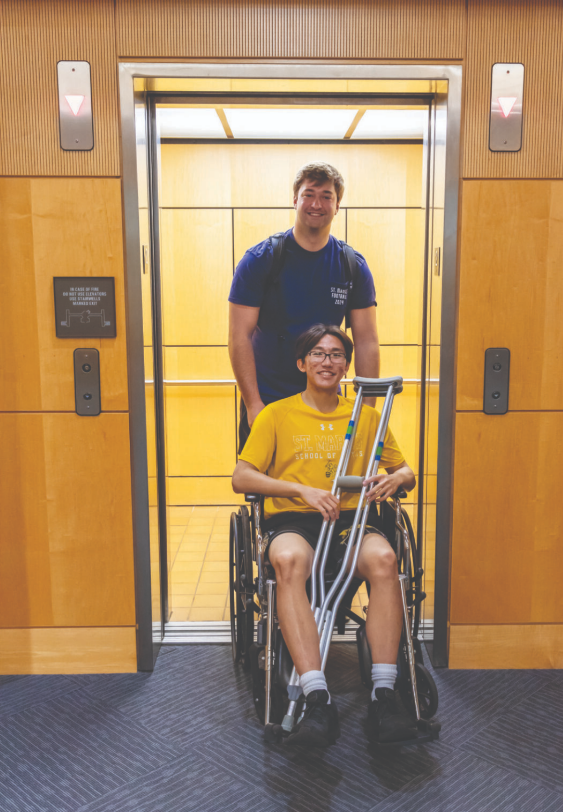
Photo by Bryan Li
Senior Henry Estes helps sophomore Dylan Bosita out of an elevator on campus
He got it examined, and although the trainer said it could lead to a fracture, he assumed that two weeks of rest would give it ample time to heal.
But just days after his recovery, sophomore Dylan Bosita felt a pop in his hip, sending him tumbling across the polyurethane track. Someone told him to get up, but he couldn’t. He tried to move his knee, but he couldn’t.
Adrenaline was rushing through his system to drown out the pain, but he could tell something was wrong. After a short stay in the hospital, Bosita was back to moving around campus — but now, in a wheelchair. Because of his pelvic avulsion fracture, he was unable to raise his left leg, forcing him to relearn the way he lived his everyday life.
“You never really think about what goes into everyday life for someone in a wheelchair,” Bosita said. “You can’t wash your hands, you can’t open a door by yourself and you need to ask others for help all the time. I needed more help in pretty much everything I did.”
Although he was initially frustrated with his newfound struggles, over the coming weeks, he began to see his injury as an opportunity for self-improvement, aided by his supporters in and out of school.
“I usually try to help my friends and do things for myself because I don’t like asking for favors,” Bosita said. “But being in a wheelchair makes it so that I have to ask others for help. That’s been a big lesson for me to learn, and in that way, being in a wheelchair has given me a new perspective.”
With no shortage of activities to manage on campus, Bosita was forced to manage his time differently — paying attention to how long every trip to the next class takes, budgeting time to make room for physical therapy after school and even spending more of his free periods exclusively on homework.
To help get himself back on track, Bosita met with Director of Academic Success Julie Pechersky, who helped him manage his workload.
“Schoolwork was the biggest learning curve,” Bosita said. “I met with Mrs. Pechersky to work out my schedule. I had to move around five tests and an essay, so I didn’t know what to do, but she was super helpful. If I need help, I just need to email her and ask about something, and she’ll respond within the hour.”
School nurse Julie Doerge, who greets Bosita every morning to wheel him to his first classes, has made sure every building is in accordance with the Americans with Disabilities Act (ADA) of 1990 so that boys can feel comfortable and enabled while at school.
“Every building is accessible; it’s all very intentionally designed,” Doerge said. “The only place that you can’t really get to by elevator is Decherd, so boys come down the back entrance that’s only three steps down.”
Even when students aren’t at school, Doerge monitors and checks in with students, working with the athletic trainers to keep updated with the newest information when students may not be sure of their injuries themselves.
“Our healthcare team always lets us know if an injury happens on the weekend so that we’re ready on Monday,” Julie said. “We also ask parents to reach out to us when there’s a situation. Sometimes guys are embarrassed, but we’re just trying to keep you safe.”
Although injuries never come at a good time, Bosita has chosen to see the positive results of his condition instead of dwelling on the negative impacts.
“It showed me that people really care, even if you don’t know them that well,” Bosita said. “There have been lower schoolers who have asked if I needed help being pushed around, and it’s been really amazing to see how even younger marksmen are just as willing to help me. It’s been a community-building thing for me.”
For others who may find themselves limited in their abilities, Bosita encourages them to try and take advantage of their new opportunities. Although he acknowledges that his injury set him back in numerous areas, he has confidence that he will not only regain his abilities but also gain new perspectives he didn’t have before.
“When you’re not disabled, you take a lot of things for granted,” Bosita said. “When you are, you’re forced to take that step back. That’s an eye-opening experience. Initially, you’re going to have to relearn a lot of things, but you’ll learn new skills and learn to appreciate others in a different way. Don’t beat yourself up in the beginning. Let go a little bit and realize that you’re in a wheelchair and you need to ask for help.”